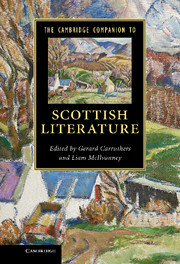Book contents
- Frontmatter
- Contents
- Notes on Contributors
- Acknowledgements
- Chronology
- Introduction
- 1 Scottish Literature before Scottish Literature
- 2 The Medieval Period
- 3 Reformation and Renaissance
- 4 The Aftermath of Union
- 5 Robert Burns
- 6 Enlightenment, Romanticism and the Scottish Canon
- 7 Scott and the Historical Novel
- 8 The Gaelic Tradition
- 9 Scottish Gothic
- 10 Victorian Scottish Literature
- 11 Robert Louis Stevenson
- 12 Hugh MacDiarmid and the Scottish Renaissance
- 13 Popular Fiction
- 14 Muriel Spark
- 15 The Glasgow Novel
- 16 ‘What is the language using us for?’
- 17 The Emergence of Scottish Studies
- 18 Otherworlds
- 19 Scottish Literature in Diaspora
- Index
- References
Introduction
Published online by Cambridge University Press: 05 January 2013
- Frontmatter
- Contents
- Notes on Contributors
- Acknowledgements
- Chronology
- Introduction
- 1 Scottish Literature before Scottish Literature
- 2 The Medieval Period
- 3 Reformation and Renaissance
- 4 The Aftermath of Union
- 5 Robert Burns
- 6 Enlightenment, Romanticism and the Scottish Canon
- 7 Scott and the Historical Novel
- 8 The Gaelic Tradition
- 9 Scottish Gothic
- 10 Victorian Scottish Literature
- 11 Robert Louis Stevenson
- 12 Hugh MacDiarmid and the Scottish Renaissance
- 13 Popular Fiction
- 14 Muriel Spark
- 15 The Glasgow Novel
- 16 ‘What is the language using us for?’
- 17 The Emergence of Scottish Studies
- 18 Otherworlds
- 19 Scottish Literature in Diaspora
- Index
- References
Summary
The temptation to tell, not just a history but the ‘story’ of Scottish literature has often been a strong one. Three watershed dates – 1560, 1603 and 1707 – invite us to plot the trajectory of Scottish literature against the nation’s mutating constitutional status. The Protestant Reformation, the Union of the Crowns and the Union of the Parliaments: There is a sense in which each of these events represents a realignment and, arguably, an impairment of native cultural identity. Taken together, these events have been read as staging posts on a process of regrettable Anglicization in post-medieval Scotland. Alternatively, this timeline can be presented more positively as the story of Scotland’s growing ‘modernity’, the emergence of a peripheral European nation into the embracing lingua franca of English. The complex arguments that swirl around Scotland’s historical ‘losses’ and ‘gains’ are often coloured by particular political and cultural perspectives. We might ask, however, if these events necessarily lend themselves to one singular, overarching conclusive cultural interpretation. The Reformation has been read, most famously by twentieth-century poet Edwin Muir, as promoting an ‘alien’ English language and relegating Scots to a congeries of dialects. For Muir, this linguistic catastrophe forecloses the possibility of an integrated, nationally confident ‘Scottish literature’ worthy of the name. But does a national literature require a national language? What makes a ‘regional’ dialect unfit for literature? Muir bemoans the cultural depredations of Calvinism but ignores the vital new prose tradition that emerges with John Knox. Alongside Knox, we might class David Lyndsay, James VI, William Drummond of Hawthornden, James Thomson, Robert Burns, Walter Scott, James Hogg, Margaret Oliphant, Robert Louis Stevenson, Hugh MacDiarmid and Muriel Spark as writers whose works are informed by the ethos and theology of Scottish Presbyterianism. Are these writers simply to be dismissed, by the inevitable logic of Muir’s position, as a wrong turn in the river?
- Type
- Chapter
- Information
- The Cambridge Companion to Scottish Literature , pp. 1 - 12Publisher: Cambridge University PressPrint publication year: 2012
References
- 2
- Cited by

